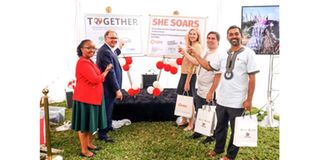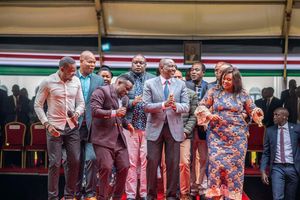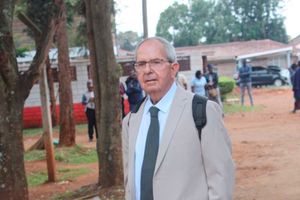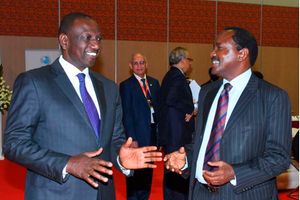Canada-funded health, gender parity projects to empower women, girls

Canada High Commissioner Christopher Thornley (second left), lead family planning officer at Ministry of Health Estella Waiguru (left), SHE SOARS chief of party Rebecca Davidson (3rd left), Adventist Development and Relief Agency Kenya Country Director Nitin Pappachen and Executive Director Steve Matthews (2nd right) at the Canadian High Commission residence on May 18, 2022, during the launch of Together and She Soars.
What you need to know:
- The two projects will be run by the Adventist Development and Relief Agency (Adra) and Care International for the next six years.
- They will champion gender equality, improve access to reproductive sexual health and education, and equip women and girls with 21st century skills.
Tens of thousands of under-fives, adolescent girls and women are set to benefit from multibillion-shilling projects funded by the Canadian government.
This emerged during the launch of Uniting Towards Gender Equality for the enjoyment of women's and girls' Total Health and Rights (Together) and Sexual and Reproductive Health and Economic Empowerment, Supporting Out-of-School Adolescent Girls’ Rights and Skills (She Soars).
The two projects will be run by the Adventist Development and Relief Agency (Adra) and Care International for the next six years. They will champion gender equality, improve access to reproductive sexual health and education, and equip women and girls with 21st century skills.
Adra Kenya will lead Together in Turkana West and targets at least 24,000 individuals. The Together project in Kenya will receive C$7.5 million (Sh681,440,000) out of the C$32 million (Sh2.9 billion) disbursed to run its activities in four countries. The other countries are Uganda, Cambodia and Philippines.
On the other hand, She Soars will be managed by Care International and will receive C$45 million (Sh4.08 billion) to run its project across Kenya, Uganda, Zambia and Tanzania. In Kenya, the project will target girls in Kajiado, Kisumu, Siaya and Nairobi counties.
Speaking on Wednesday last week during the launch of the projects at his official residence in Nairobi, Canadian High Commissioner Christopher Thornley termed the initiatives crucial, as many women and girls, especially adolescents, had been neglected for a long time.
When girls and women have no access to sexual reproductive health information and services or cannot express their needs and wishes related to these services, they often find themselves pregnant, married at an early age, out of school and at times even abandoned by their families and peers, the envoy said.
Commitment
“We know that when we invest in girls and women, societies flourish. These initiatives are examples of Canada’s commitment to the health, rights and well-being of the marginalised, particularly women, adolescent girls and children around the world,” he said.
Dr Estella Waiguru, lead family planning officer at the Ministry of Health, emphasised the importance of the projects, especially with adolescents in Kenya accounting for up to 24 per cent of the national population.
Data from the Kenya Demographic and Health Survey shows that 18 per cent of girls under the age of 18 are pregnant and at least 13,000 of them were forced out of school because of pregnancy. With this startling background, Dr Waiguru said the two projects are timely as they would aid greatly address the plight of girls.
The HIV infection rate among the Kenyan youth is also alarming, with The National Aids and STI Control Programme (Nascop) saying at least 50 per cent of all new HIV/Aids cases occur within the 15-24 age bracket, hence any intervention to reduce that gap is highly welcome, Dr Waiguru said.
Whereas the health system is facing numerous challenges, including lack of quality information and inadequate financing, he said the government is committed to strengthening health facilities and prioritising sexual reproductive health.
Policies
“It is time to look at the prevailing circumstances and provide solutions to these problems. We have policies in place, but it is true we have some gaps and the Covid-19 pandemic uncovered the lid off many societal issues affecting our girls and women,” she said.
Adra boss Steve Mathews said Together was a project they had planned for a long time and expressed his confidence in the activities they would run to address the challenges faced by many vulnerable Kenyans, especially in accessing quality healthcare.
“Our purpose is to serve humanity. There is increased gender-based violence and it is sad that such violence is accepted by social norms and again, there is limited services for sexual and gender-based violence (SGBV) survivors. We aim to address this and will also work in refugee camps and settlements,” he said.
Dr Maureen Miruka, executive director at Care International-Kenya, noted that very few health centres in the country have facilities to suit the needs of the youth and urged the government to improve the quality of health facilities.
Dr Miruka, a passionate educationist, said the She Soars project will focus on educating girls in Nairobi, Kajiado, Kisumu and Siaya counties.
“Gender equality must be taken very seriously in marginalised areas and other places. This is not just work for civil societies and organisations such as Care and ADRA, we need our men to also get involved in championing gender equality,” she said.
Grim picture in Turkana
Turkana Health executive Jane Ajele said GBV, high number of school dropouts, early marriages and gender stereotypes were rife in the county and expressed her optimism with Together, saying it would be of great importance to aid in ending the challenges faced by their girls.
She revealed that whereas the national average for assault incidents in the country was 15.7 per cent, Turkana’s rate stood at 35.7 per cent. Rape is also high, standing at 34.6 per cent, against the country’s average of 12.9 per cent, sexual abuse prevalence in Turkana is 23.7, nearly six times that of the country at 4.3 per cent.
Cultural normalisation, drug and alcohol abuse, discrimination of women and lack of reporting of SGBV incidents due to lack of awareness of their rights and stigmatization were among the key issues Ms Ajele said to be promoting the vice.
“This project will increase awareness and our girls will be empowered in many ways and even know their rights. It will go a long way in helping us deal with these cases,” Ms Ajele said.




